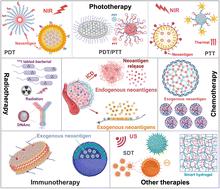当前位置:
X-MOL 学术
›
Chem. Soc. Rev.
›
论文详情
Our official English website, www.x-mol.net, welcomes your feedback! (Note: you will need to create a separate account there.)
Advancing nanotechnology for neoantigen-based cancer theranostics
Chemical Society Reviews ( IF 46.2 ) Pub Date : 2024-02-21 , DOI: 10.1039/d3cs00162h Jianhua Zou 1, 2 , Yu Zhang 1, 2 , Yuanbo Pan 1, 2 , Zhengwei Mao 3, 4, 5 , Xiaoyuan Chen 1, 2, 6, 7
Chemical Society Reviews ( IF 46.2 ) Pub Date : 2024-02-21 , DOI: 10.1039/d3cs00162h Jianhua Zou 1, 2 , Yu Zhang 1, 2 , Yuanbo Pan 1, 2 , Zhengwei Mao 3, 4, 5 , Xiaoyuan Chen 1, 2, 6, 7
Affiliation

|
Neoantigens play a pivotal role in the field of tumour therapy, encompassing the stimulation of anti-tumour immune response and the enhancement of tumour targeting capability. Nonetheless, numerous factors directly influence the effectiveness of neoantigens in bolstering anti-tumour immune responses, including neoantigen quantity and specificity, uptake rates by antigen-presenting cells (APCs), residence duration within the tumour microenvironment (TME), and their ability to facilitate the maturation of APCs for immune response activation. Nanotechnology assumes a significant role in several aspects, including facilitating neoantigen release, promoting neoantigen delivery to antigen-presenting cells, augmenting neoantigen uptake by dendritic cells, shielding neoantigens from protease degradation, and optimizing interactions between neoantigens and the immune system. Consequently, the development of nanotechnology synergistically enhances the efficacy of neoantigens in cancer theranostics. In this review, we provide an overview of neoantigen sources, the mechanisms of neoantigen-induced immune responses, and the evolution of precision neoantigen-based nanomedicine. This encompasses various therapeutic modalities, such as neoantigen-based immunotherapy, phototherapy, radiotherapy, chemotherapy, chemodynamic therapy, and other strategies tailored to augment precision in cancer therapeutics. We also discuss the current challenges and prospects in the application of neoantigen-based precision nanomedicine, aiming to expedite its clinical translation.
中文翻译:

推进基于新抗原的癌症治疗学的纳米技术
新抗原在肿瘤治疗领域发挥着关键作用,包括刺激抗肿瘤免疫反应和增强肿瘤靶向能力。尽管如此,许多因素直接影响新抗原在增强抗肿瘤免疫反应方面的有效性,包括新抗原的数量和特异性、抗原呈递细胞(APC)的摄取率、在肿瘤微环境(TME)内的停留时间以及它们促进抗肿瘤免疫反应的能力。用于激活免疫反应的 APC 的成熟。纳米技术在多个方面发挥着重要作用,包括促进新抗原释放、促进新抗原递送至抗原呈递细胞、增强树突状细胞对新抗原的摄取、保护新抗原免遭蛋白酶降解以及优化新抗原与免疫系统之间的相互作用。因此,纳米技术的发展协同增强了新抗原在癌症治疗诊断中的功效。在这篇综述中,我们概述了新抗原的来源、新抗原诱导的免疫反应的机制以及基于新抗原的精准纳米医学的演变。这包括各种治疗方式,例如基于新抗原的免疫疗法、光疗、放疗、化疗、化学动力学疗法以及其他旨在提高癌症治疗精度的策略。我们还讨论了基于新抗原的精准纳米医学应用当前的挑战和前景,旨在加快其临床转化。
更新日期:2024-02-21
中文翻译:

推进基于新抗原的癌症治疗学的纳米技术
新抗原在肿瘤治疗领域发挥着关键作用,包括刺激抗肿瘤免疫反应和增强肿瘤靶向能力。尽管如此,许多因素直接影响新抗原在增强抗肿瘤免疫反应方面的有效性,包括新抗原的数量和特异性、抗原呈递细胞(APC)的摄取率、在肿瘤微环境(TME)内的停留时间以及它们促进抗肿瘤免疫反应的能力。用于激活免疫反应的 APC 的成熟。纳米技术在多个方面发挥着重要作用,包括促进新抗原释放、促进新抗原递送至抗原呈递细胞、增强树突状细胞对新抗原的摄取、保护新抗原免遭蛋白酶降解以及优化新抗原与免疫系统之间的相互作用。因此,纳米技术的发展协同增强了新抗原在癌症治疗诊断中的功效。在这篇综述中,我们概述了新抗原的来源、新抗原诱导的免疫反应的机制以及基于新抗原的精准纳米医学的演变。这包括各种治疗方式,例如基于新抗原的免疫疗法、光疗、放疗、化疗、化学动力学疗法以及其他旨在提高癌症治疗精度的策略。我们还讨论了基于新抗原的精准纳米医学应用当前的挑战和前景,旨在加快其临床转化。



























 京公网安备 11010802027423号
京公网安备 11010802027423号